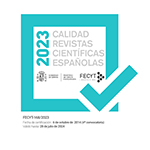Engagement y/o intensificación del trabajo ¿opción y/o obligación?: «Si no haces lo que te gusta, te tiene que gustar lo que haces»
Resumen
El engagement en el trabajo se ha convertido en el nuevo one-best-way organizativo: pasión y esfuerzo discrecional que garantizaría productividad y bienestar. Este planteamiento renovado de los discursos del management enmarca nuestro objetivo general de profundizar en las contradicciones del engagement en el trabajo. El artículo se apoya en trabajo de campo cualitativo en una multinacional líder del sector TIC, donde la dedicación al trabajo y la pasión estructuran los discursos de los profesionales y mandos cualificados entrevistados. Se encuentra una sofisticación de los mecanismos de control normativos/culturales en línea con lo que la literatura internacional denomina mecanismos neo-normativos, que como sus antecesores, se apoyan en procesos de subjetivación que actúan a nivel identitario. La pasión emerge como una característica esencial de una dedicación al trabajo que se justifica como el resultado de decisiones personales, voluntarias, pese a sus riesgos en la conciliación y en la salud. Sin embargo, el análisis del discurso sugiere que la pasión, más que una opción voluntaria o un fin, parece emerger como una obligación necesaria, un medio para sostener la intensificación del trabajo. Los resultados apoyan la creciente (con)fusión para evaluar el origen interno/externo de las exigencias y el control asociado al llamado trabajo del conocimiento, en sintonía con dinámicas sociales de empresarialización y autogestión más amplias. Esto cuestionaría la validez de los modelos de riesgos psicosociales y sugeriría la necesidad de promover una aproximación sociológica compleja al estudio del estrés laboral.
Descargas
Descarga artículo
Licencia
La revista Política y Sociedad, para fomentar el intercambio global del conocimiento, facilita el acceso sin restricciones a sus contenidos desde el momento de su publicación en la presente edición electrónica, y por eso es una revista de acceso abierto. Los originales publicados en esta revista son propiedad de la Universidad Complutense de Madrid y es obligatorio citar su procedencia en cualquier reproducción total o parcial. Todos los contenidos se distribuyen bajo una licencia de uso y distribución Creative Commons Reconocimiento 4.0 (CC BY 4.0). Esta circunstancia ha de hacerse constar expresamente de esta forma cuando sea necesario. Puede consultar la versión informativa y el texto legal de la licencia.











